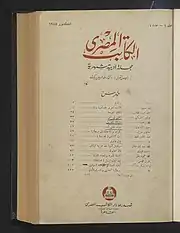Al-Katib al-misri (magazine)
The Egyptian journal al-Katib al-misri (Arabic: الكاتب المصري; DMG: al-Kātib al-miṣrī; English: "The Egyptian Writer") was published in Cairo monthly from 1945–1948. It was founded originally by the Egyptian Press and Publishing House owned by the Jewish al-Harari family who entrusted Taha Hussein (1889-1973) with the management.[1] The magazine was published in total in 32 issues and was available in numerous Arab metropolises.[2]
 | |
| Editor | Taha Hussein |
|---|---|
| Categories | Literature, Arts, Science |
| Year founded | 1945 |
| Final issue | 1948 |
| Country | Egypt |
| Based in | Cairo |
| Language | Arabic |
| Website | nbn-resolving |
The focus of the journal was the publication of international literature and literary criticism, which were translated into Arabic and so helped to reach a broader readership. Both Arabic and non-Arabic art, literature and science were encouraged and a dialogue between Arabic and other languages should be established.[3]
As one of the first post-war magazines, al-Kātib al-miṣrī also aimed to make its vision of the enlightenment accessible to all and to promote mutual cultural exchange.[4] "Literature should be lifted above all conflicts existing world-wide."[5]
Arabic translations among others, of works by Antoine de Saint-Exupéry or Jean-Paul Satre,[6] were published, texts of promising new Arab authors[7] as well as literary criticism, which also offered an introduction by Western authors such as James Joyce or Franz Kafka.[8]
Moreover, two other sections also discussed in detail the contents and orientations of Arabic and European periodicals of the time.[9] In 1948, the publication of the magazine was stopped, whereby it is not clear whether this was spontaneous or under governmental pressure.[10]
References
- Mohamed El-Bendary (2010): The Egyptian Press and Coverage of Local and International Events. US Lexington Books, Lanham, p. 3.
- May Hawas (2018): Taha Hussein and the Case for World Literature. In: Comparative Literature Studies. Vol. 55, Issue 1, p. 66–92.
- May Hawas (2018): Taha Hussein and the Case for World Literature. In: Comparative Literature Studies. Vol. 55, Issue 1, p. 66–92.
- Jens Hanssen and Max Weiss (2018): Arabic Thought against the Authoritarian Age: Towards an Intellectual History of the Present. Cambridge University Press, Cambridge, p. 45.
- al-Kātib al-Miṣrī (1945), Vol. 1, Issue 1-3.
- Jens Hanssen and Max Weiss (2018): Arabic Thought against the Authoritarian Age: Towards an Intellectual History of the Present. Cambridge University Press, Cambridge, p. 46.
- Christopher Dwight Micklethwait (2010): Faits Divers: National Culture and Modernism in Third World Literary Magazines. Diss. The University of Texas at Austin, p. 175.
- Elisabeth Kendall (2006): Literature, Journalism and the Avant-Garde: Intersection in Egypt. Taylor and Francis Routledge, New York/ London, p. 55 ff.
- Christopher Dwight Micklethwait (2010): Faits Divers: National Culture and Modernism in Third World Literary Magazines. Diss. The University of Texas at Austin, p. 184.
- Elisabeth Kendall (2006): Literature, Journalism and the Avant-Garde: Intersection in Egypt. Taylor and Francis Routledge, New York/ London, p. 56.